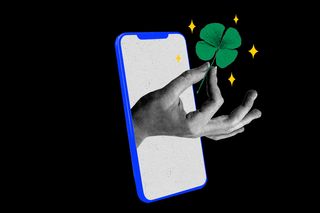
‘Lucky Girl Syndrome’ – The Newest Manifestation Trend That Sets Us up for Failure
The trend implies that everyone — irrespective of their socio-economic privileges — has the same shot at being “lucky.”

“I am powerful and in control of my reality. I attract all that is good in this universe. I find myself in a state of perpetual happiness,” says an Instagram reel. It sums up the internet’s latest obsession: the “lucky girl syndrome,” which is yet another embodiment of the manifestation trend. On some level, most of us are aware that manifestation works about as well as rituals rooted in astrology. And so, even if it doesn’t align with our personal beliefs, we dismiss it as a harmless, feel-good trend. In doing so, though, we may fail to notice its darker side.
Known by numerous names — lucky girl syndrome, manifestation, positive thinking, the law of attraction, mind over matter — the core ideal of this belief system is that our thoughts are omnipotent, and wield the power to shape our destinies. Before the age of social media, too, manifestation had made its presence known: through bestsellers like Napoleon Hill’s Think and Grow Rich (1937), and Rhonda Byrne’s The Secret (2006). In the digital age, however, its reach has multiplied astronomically.
The trend implies that everyone — irrespective of their socio-economic privileges — has the same shot at being “lucky,” simply by believing it. When Alia Bhatt married Ranbir Kapoor last year, the internet was in awe of her manifestation skills — not only was she one of the leading actors in the Hindi film industry, but was also marrying the man she had a crush on for years. Indeed, Bhatt resembled, nay epitomized, the ultimate “lucky girl.” But it wasn’t the power of manifestation alone that steered her career and love life; her connections within the movie industry — through the privilege of being born to Bollywood insiders — gave her the kind of headstart most people without the same privileges couldn’t even imagine.
“The hard truth is that some individuals just start with stronger tools, resources, family systems, privileges, opportunities, and abilities than others,” Don Grant, a psychologist with specific expertise in technology’s impact on mental health, explains. “That certainly doesn’t mean that people can’t overcome obstacles, but the reality is that it can be harder for them to do so without the same baseline assets. It also could be argued that believing in luck is an entitled luxury for the privileged.”
Related on The Swaddle:
Why Influencers Promoting ‘Hustle Culture’ to Young Followers Is a Dangerous Trend
In that sense, the evils of lucky girl syndrome are akin to that of hustle culture — a trend rooted in the capitalist myth of hard work and merit leading to rewards — except, here, the work is in the intangible form of manifesting invisible energy. Hustle culture determines individuals’ worth on the basis of the number of hours they devote to their careers; the manifestation trend does it by connecting it to their spiritual wellbeing. As an earlier critique of the hustle culture by The Swaddle stated: “[H]ustle-worshipping influencers often forget to acknowledge that the socio-economic conditions, which may have had a role to play in affording them the kind of access and opportunities that enabled their online growth, might be unavailable to many of their followers who don’t have comparable class-and-caste privileges.”
Moreover, in a culture that swears by manifestation, it becomes easier to blame people for their lot in life by saying they didn’t will success enough. In fact, there are scores of articles online on how one might be manifesting in the “wrong” way even though there’s no scientific evidence on whether manifestation really works — let alone the “right” way to do it. According to Ariela Vasserman, a psychologist, the trend indeed promotes “a lot of blame.”
Whitney Goodman, a Miami-based psychotherapist, told the Washington Post about being approached by clients questioning why they weren’t able to manifest things through the sheer power of thinking. “There was a lot of shame and guilt around it,” Goodman noted. “That’s the biggest problem I have with manifestation: It puts all the responsibility on you. If I was living in poverty, or a natural disaster came and took my house down, it’s sort of like, ‘Did I cause that? Was it my thoughts that led this to happen?’ And, of course, the world is so immensely random that that’s just not possible.” Through this blame game, though, over time, proponents of manifestation come hauntingly chose to gaslighting.
Experts believe this is precisely why manifestation trends — like the “lucky girl syndrome” — are targeted at women. Speaking to Fortune, Angelica Malin, a leadership coach, explains that since women are more likely to fall prey to doubting themselves and feeling like an impostor due to decades of disrespect, manifestation trends target them — often pitting them against other women, too. “[We] internalize our failings as our wrongdoing and something that we could change if it was just our thinking was better.”
Highlighting the sexism entrenched in the trend, Malin continues, “It’s a lot of empty promises, around what can happen when you simply change your thoughts… It disregards all the very practical, economic, [and] gender bias factors that might be holding women back. What about the structural stuff, that might be why women are not receiving the salary of their dreams… It’s [only] going to happen with some quite real systematic change.”
Related on The Swaddle:
The ‘Quiet Quitting’ Trend Has a Branding Problem
Not only does the trend blame people for their shortcomings, then — it also undermines successes by putting them down to energy rather than labor. On both fronts, then, the lucky girl syndrome takes all women down a few notches. And worse, it could even be setting us up for failure from the get-go; attributing one’s success entirely to manifestation sends the message that wishing for something is more important than actually working towards it.
“What we find is the more positively people daydream and fantasize about their future desires and wishes coming true, the less they’ll actually put in the effort,” notes Gabriele Oettingen, a professor of psychology at the New York University, who has spent years researching the effects of positive thinking. According to her, trends like manifestation can serve as a hindrance to success by breeding complacency.
Goodman worries that the trend can easily prompt people to avoid seeking medical treatments — by inspiring the idea that they can heal by simply willing their ailments away. Not only that, but it can also make people less cautious. “I see people putting themselves in dangerous situations, because they have this belief that, ‘Well, it’s all just going to work out, and I’ll get what I put into the universe,” Goodman adds.
The mystical powers of manifestation also bring forth a number of mental health risks. Leading individuals to believe that their negative emotions are responsible for negative events in their lives can trigger a cycle of self-hate — besides causing people to suppress negative thoughts, allowing them to fester within. Among people living with OCD and anxiety, manifestation can be a particularly bad influence — forcing them into the realm of rituals and compulsive behaviors in a bid to control things not actually within their control. Not only that, but “if you’re convinced something is going to happen and it doesn’t, people don’t know how to deal with that. It can make you lazy and could lead to depression or anxiety issues,” John Kenney, a relationship coach, told The Independent.
The lucky girl syndrome seems rather unlucky for humankind, eh?
Devrupa Rakshit is an Associate Editor at The Swaddle. She is a lawyer by education, a poet by accident, a painter by shaukh, and autistic by birth. You can find her on Instagram @devruparakshit.
Related


Woe Is Me! “My Parents Want Me to Dump My Boyfriend for an Arranged Marriage. What Now?”
